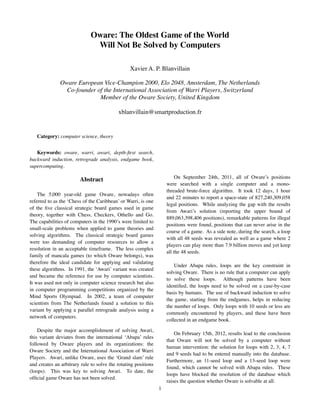Abstract_OwareSolution_XavierBlanvillain_120226
•
0 likes•137 views
Report
Share
Report
Share
Download to read offline

Recommended
Recommended
More Related Content
Featured
Featured (20)
Product Design Trends in 2024 | Teenage Engineerings

Product Design Trends in 2024 | Teenage Engineerings
How Race, Age and Gender Shape Attitudes Towards Mental Health

How Race, Age and Gender Shape Attitudes Towards Mental Health
AI Trends in Creative Operations 2024 by Artwork Flow.pdf

AI Trends in Creative Operations 2024 by Artwork Flow.pdf
Content Methodology: A Best Practices Report (Webinar)

Content Methodology: A Best Practices Report (Webinar)
How to Prepare For a Successful Job Search for 2024

How to Prepare For a Successful Job Search for 2024
Social Media Marketing Trends 2024 // The Global Indie Insights

Social Media Marketing Trends 2024 // The Global Indie Insights
Trends In Paid Search: Navigating The Digital Landscape In 2024

Trends In Paid Search: Navigating The Digital Landscape In 2024
5 Public speaking tips from TED - Visualized summary

5 Public speaking tips from TED - Visualized summary
Google's Just Not That Into You: Understanding Core Updates & Search Intent

Google's Just Not That Into You: Understanding Core Updates & Search Intent
The six step guide to practical project management

The six step guide to practical project management
Beginners Guide to TikTok for Search - Rachel Pearson - We are Tilt __ Bright...

Beginners Guide to TikTok for Search - Rachel Pearson - We are Tilt __ Bright...
Abstract_OwareSolution_XavierBlanvillain_120226
- 1. Oware: The Oldest Game of the World Will Not Be Solved by Computers Xavier A. P. Blanvillain Oware European Vice-Champion 2000, Elo 2048, Amsterdam, The Netherlands Co-founder of the International Association of Warri Players, Switzerland Member of the Oware Society, United Kingdom xblanvillain@smartproduction.fr Category: computer science, theory Keywords: oware, warri, awari, depth-first search, backward induction, retrograde analysis, endgame book, supercomputing. Abstract The 5,000 year-old game Oware, nowadays often referred to as the ‘Chess of the Caribbean’ or Warri, is one of the five classical strategic board games used in game theory, together with Chess, Checkers, Othello and Go. The capabilities of computers in the 1990’s were limited to small-scale problems when applied to game theories and solving algorithms. The classical strategic board games were too demanding of computer resources to allow a resolution in an acceptable timeframe. The less complex family of mancala games (to which Oware belongs), was therefore the ideal candidate for applying and validating these algorithms. In 1991, the ‘Awari’ variant was created and became the reference for use by computer scientists. It was used not only in computer science research but also in computer programming competitions organized by the Mind Sports Olympiad. In 2002, a team of computer scientists from The Netherlands found a solution to this variant by applying a parallel retrograde analysis using a network of computers. Despite the major accomplishment of solving Awari, this variant deviates from the international ‘Abapa’ rules followed by Oware players and its organizations: the Oware Society and the International Association of Warri Players. Awari, unlike Oware, uses the ‘Grand slam’ rule and creates an arbitrary rule to solve the rotating positions (loops). This was key to solving Awari. To date, the official game Oware has not been solved. On September 24th, 2011, all of Oware’s positions were searched with a single computer and a mono- threaded brute-force algorithm. It took 12 days, 1 hour and 22 minutes to report a space-state of 827,240,309,058 legal positions. While analyzing the gap with the results from Awari’s solution (reporting the upper bound of 889,063,398,406 positions), remarkable patterns for illegal positions were found, positions that can never arise in the course of a game. As a side note, during the search, a loop with all 48 seeds was revealed as well as a game where 2 players can play more than 7.9 billion moves and yet keep all the 48 seeds. Under Abapa rules, loops are the key constraint in solving Oware. There is no rule that a computer can apply to solve these loops. Although patterns have been identified, the loops need to be solved on a case-by-case basis by humans. The use of backward induction to solve the game, starting from the endgames, helps in reducing the number of loops. Only loops with 10 seeds or less are commonly encountered by players, and these have been collected in an endgame book. On February 15th, 2012, results lead to the conclusion that Oware will not be solved by a computer without human intervention: the solution for loops with 2, 3, 4, 7 and 9 seeds had to be entered manually into the database. Furthermore, an 11-seed loop and a 13-seed loop were found, which cannot be solved with Abapa rules. These loops have blocked the resolution of the database which raises the question whether Oware is solvable at all. 1
- 2. Biography Xavier Blanvillain, born in France in 1969, has been playing Oware for over 20 years. He first started competing in 1999, in competitions mainly organized by the Mind Sports Olympiad, the Oware Society and the International Association of Warri Players, which he co-founded in 2008 in Switzerland. He has won prizes at both national and international levels, including Belgian champion in 1999, Italian champion in 2000, UK champion in 2002 and European vice-champion in 2000. Solving the game of Oware has been his passion for the last 10 years. He acquired a supercomputer that made this research possible in 2011. Xavier holds a MBA from the Rotterdam School of Management and a MSc from the French Grande École ESEO. He has worked as an entrepreneur and a consultant, and currently works in upper management in the Consumer Electronics industry. 2
